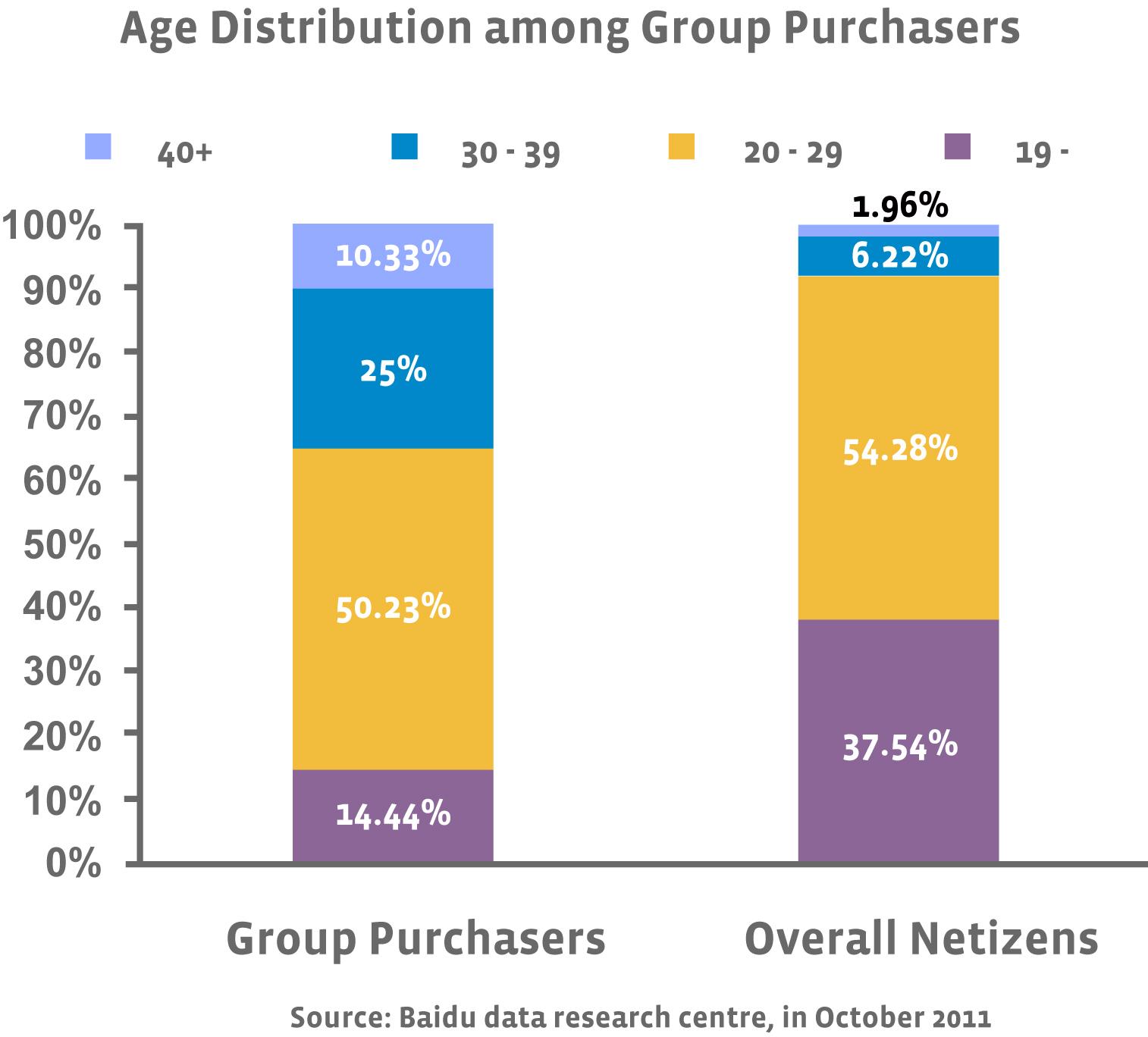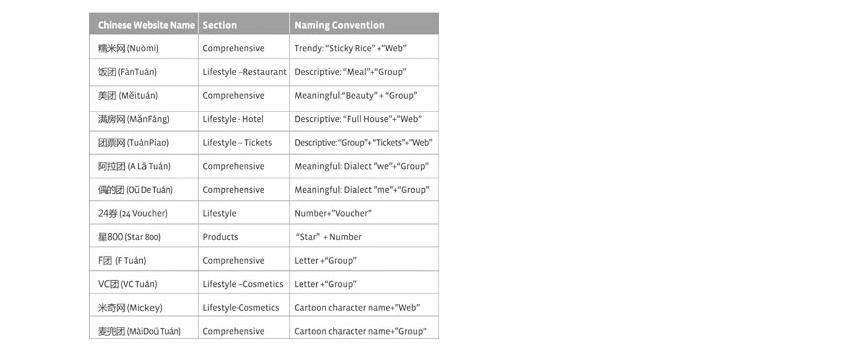

Name Analysis: Group Purchase Brands in China
Waiting for a Winner
According to the 2011 Electronic Commerce Data Analysis Report, China’s online group-purchase market has expanded to more than 5000 companies with 52 million average users. Group-purchase or “团购” (túan gòu) in China are growing. In this lucrative yet fiercely competitive market, it is particularly important for companies to choose their online name strategically to build a distinct identity.
From B2B, B2C, C2C, to the group-purchase model, internet electronic commerce has experienced rapid expansion and development. In China, B2B has Alibaba, B2C has Amazon, and C2C has Taobao. Now, the attention is on group-purchase websites. Who will prevail to become the next industry leader? As competition heats up, each brand is trying to build its unique identity. A website’s name will be a key element of their success. A brand name represents the brand’s values and its equity; thus, it must be dealt with strategically.
In this issue of Name Analysis, we will give an overview of the group purchase industry in China, and explore the common brand naming approaches. Overall, there do not appear to be many highly differentiated and captivating Chinese names yet in the group purchase category, which could represent an opportunity for new brands to capitalize on.
According to the Group Purchase Report released by Baidu Data Research Centre in October 2010, the age of group purchase users is distributed around the 20-29 years-old range. This group accounts for slightly more than half of the overall market size and is a major segment in the industry.

The report describes the profile of users who search for group purchase information on Baidu as those who are interested in American TV shows, Taiwan entertainment programs, Chinese football, digital products, fashion brands and cosmetics products. Furthermore, group purchase is popular among consumers who have a stable income, favor quality in addition to bargain prices, and follow fashion trends. Based on this, it makes sense that many group purchase website names are oftentimes young or playful in comparison to other online electronic businesses.
Several general comments can be made about group-purchasing websites in China. For one, there are low entry barriers for new brands, both financial and technological. This causes a proliferation of players, so the industry appears disordered and the quality of the goods and information on the websites is often not trustworthy. Secondly, many of the group purchase brands are copying the business model and website design of larger or original brands such as Groupon.
Domestic group purchase websites can be classified into three general categories: products, lifestyle, and comprehensive. The product section mainly offers commodity (clothing and packaged food) online shopping while the lifestyle section covers areas such as restaurant, entertainment, cosmetics, and travel. The comprehensive group is a mix of the two. Brand naming of group purchase websites are closely connected to their specific categories.
Current Group Purchase Websites Table

When the originator Groupon entered China, there were already a handful of competitors. Groupon chose its Chinese brand name as Gaopeng (高朋). 高 (gāo) means high and 朋(péng) means friend. There is a Chinese phrase 高朋满座 (gāo péng man zuò), meaning “many noble friends/guests from different places occupy all the seats”. The phrase can also mean that something is very popular or inviting. The name is phonetically similar to “Groupon” but sounds localised due to its connection with the cultural phrase.
The brand may be trying to appeal to two target audiences with this name: One is the consumers that come together to use the group-buying platform; the other is the brands themselves (restaurants, retailers, etc.) whose seats can then be full with customers. In short, as an international player, Groupon evaluated its target market and localized its Chinese brand name to have an emotional appeal.
Since the competition between group purchase websites is fierce, brands often use different naming strategies for the purpose of brand differentiation. Four main trends currently existing in the category are regional names, numbers, alphabet characters, and cartoon characters, as discussed below:
Regional
“A La Tuan” and “Ou De Tuan” both use a regional naming strategy, where a word from a local dialect is used in the brand name. “A La Tuan” (阿拉团) is a Shanghai-based group purchase website and uses the Shanghai dialect of “A La”, meaning “we”, in its brand name.
“Ou De Tuan” (偶的团) mainly serves the Beijing area and uses the local term for “me/my” in the name. The use of a dialect in the brand name is differentiating as well as practical; the only downside is that it could limit the geographical expansion of the brand. In the case of A La Tuan, they are present in 7 cities other than Shanghai, so it appears they are not letting the regional reference limit their operations.


Group Purchase Brands – Numbers
Several group purchase websites use a number in their brand name. “24 Voucher” (24 卷) is one of the first and largest lifestyle group purchase websites in China. “24” stands for “24 hours” or “every day”. The name is easy to remember and matches well the business of the brand; however it is not very evocative or attractive for consumers.
“Star 800” (星800) is said to be the first commodity products group purchase website in China. The “star” part of the name could be derived from its mother company, called 紫星(Purple Star), whose founder also has the character for star in his name. The number “800” indicates the abundant quantity of goods available. Also, the number 8 is considered to be lucky in China. While this name does have some positive connotations, again it does not seem that distinctive.


Group Purchase Brands – Alphabet Characters
“F Tuan” (F团) combines an alphabet character and a Chinese character in its brand name. The character F is used at the beginning of many words, such as fashion,fans,foods,fun,family,friends,and feelings, although it could also be associated with other negative meanings. The term “tuan” stands for 团购 , meaning “group purchase”. F Tuan offers group purchase deals for metropolitan white collar consumers. The name is easy to read and remember, but the choice of “F” seems arbitrary and may not be very appealing for the target audience.
“VC Tuan” (VC 团) uses the abbreviation of Vitamin C and tries to express the concept of Vitamin C as a daily necessity. Its slogan, matching the name, is “we are your daily vitamins”. The website focuses on providing cosmetics deals and appeals to high-end female consumers. This brand name tries to imply that cosmetics and vitamin purchases should take place daily, and is also easy to read and remember.


Cartoon
“Mickey” (米奇网) is the largest cosmetics group purchase website in China and sells high-end cosmetics products from Europe, North America, Japan and Korea. Although the character of Mickey Mouse is not highly relevant for the cosmetics category, Mickey is a well-known character in Chinese consumers’ mind and could transfer a positive image to the brand. Interestingly, the pronunciation of the Mickey Mouse name is present in the brand name alone: there is no image of Mickey Mouse on the website, actually, the brand mark is a small cat. Overall, it does not seem to be a very appropriate brand name.
“MaiDou Tuan” (麦兜团) uses a famous Hong Kong cartoon character called MaiDou in its website name. Maidou is known for his positivity, kindness and a sense of honesty. The website also uses his name in the slogan “Follow MaiDou to Group Purchase Together” (跟着麦兜一起团) If MaiDou is a character that is well known and liked by the target market, it could bring positive associations to the brand. At the same time, the use of MaiDou in the brand name and identity could give a childish and unprofessional feel.


After taking a closer look at the naming practices of group purchase websites in China, we found that there were not many different and captivating names existing in the market. The use of a regional dialect, as well as the trendy NuoMi Tuan, were more promising directions than some of the other naming conventions. Although the industry is highly competitive, an opportunity may still exist for a brand with a truly special name and service offering.
In the group-purchase market, it is often difficult to build loyalty because consumers are strongly motivated by value. However, with a strong online brand name, companies can increase brand awareness and build positive perceptions which will build brand value over time. Some skeptics speculate that the group purchase phenomenon may be a short-lived fad, or that large companies such as Taobao will take over the market. At least at present, group purchase is popular in China and many other countries. If this business model is here to stay, the brands also need effective names that can stand the test of time. So far, we are still waiting for a winner.
A Labbrand Group Company © 2005-2024 Labbrand All rights reserved
沪ICP备17001253号-3* Will be used in accordance with our Privacy Policy
To improve your experience, we use cookies to provide social media features, offer you content that targets your particular interests, and analyse the performance of our advertising campaigns. By clicking on “Accept” you consent to all cookies. You also have the option to click “Reject” to limit the use of certain types of cookies. Please be aware that rejecting cookies may affect your website browsing experience and limit the use of some personalised features.